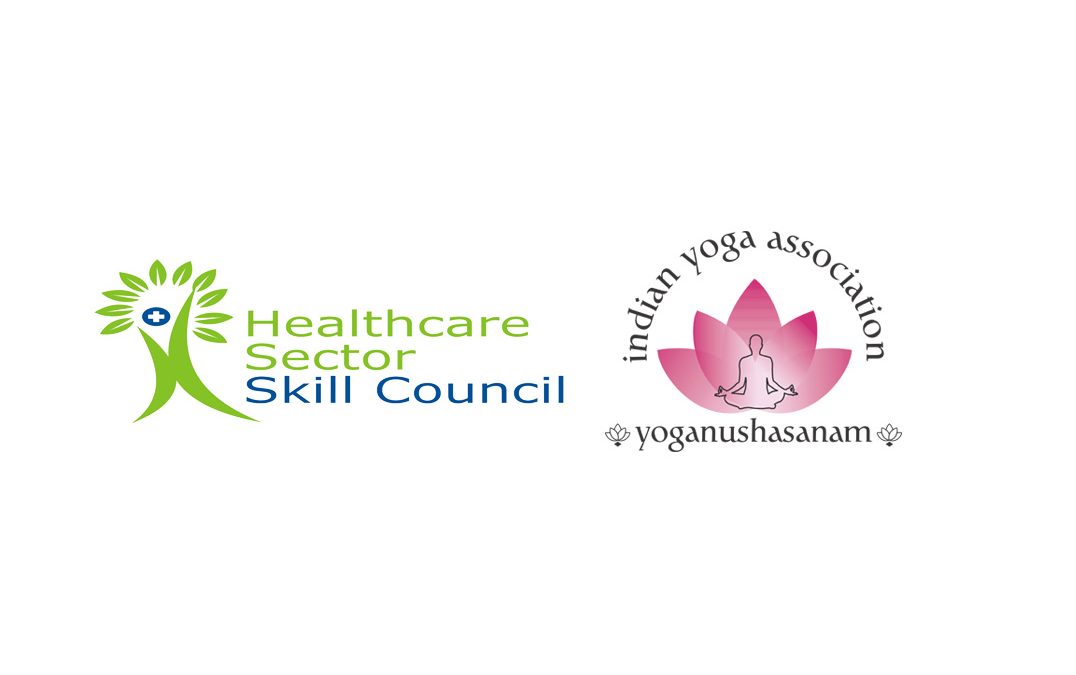Yoga Vidya Niketan (YVN), Member Institute of Indian Yoga Association successfully conducted its annual one-month Yoga Summer Course from May 1 to May 31, 2024. The course ran for one and a half hours daily across 41 physical centers around Mumbai and Navi Mumbai, extending…
Indian Yoga Association (IYA) and Healthcare Sector Skill Council (HSSC) joined hand on the historic day of September 10, 2018 to establish the roles and responsibilities of both as they relate to scale, integrate and implement skill development programs through introduction of competency standards – Qualification Packs (QP) and National Occupational Standards (NOS), learning resources and mechanism for Yoga related job roles.
To mark these revolutionary beginning HSSC agreed to identify the job roles with industry for rolling out the skilling Yoga related roles, to provide appropriate forms and formats for development of resources, conduct orientation workshop for experts to brief them about standards formats of QP, NOS, Model Curriculum, Learner Handbook, Facilitator Guide etc., to facilitate for QP NOS National Committee Meeting in Yoga, to facilitate for National Validation Workshops, Qualification Review Committee Meeting, National Skills Qualification Committee Meeting for alignment of NSQF Level, to provide resources (to the extent feasible) as mutually decided for development of QPNOS and related resources, to conduct Train the Trainer/Assessor programme, SDMS uploads etc., to monitor training on regular basis to assure training being conducted complying with minimum notional learning hours and standards and ensuring timely completion of assessment & certification of trainees.
To fulfil the above commitments, three new job roles were created:
• Assistant Yoga Instructor
• Yoga Wellness Trainer
• Yoga Therapy Assistant
Assistant Yoga Instructor
The Assistant Yoga Instructor responsibility includes maintaining the yoga space, demonstrating the yoga techniques of Common Yoga Protocol (CYP) under the guidance of a Yoga Instructor while the individual should be self-disciplined, confident, mature, patient, compassionate, active listener, should have empathy and should have strong hold on the language.
The applicable NOS for the Instructor includes carrying out activities related to yoga sessions (CYP) as per the instructions, following sanitization and infection control guidelines, maintaining a safe and secure working environment, interpersonal relationships and professional conduct.
The minimum educational qualification and experience required is 8th Class or 8th Class (ASHA and Angawadi worker) with 2years of experience. The minimum age should be 18years.
The individual at the end of the course would get proficient in:
• Explaining the concept and fundamental principles of yoga.
• Discuss the significance of yoga practices.
• Explain about Common Yoga Protocol (CYP) and its significance.
• Prepare the work area with required equipment and accessories such as AV aides, yoga mat etc. to ensure the efficiency and effectiveness of the outcome.
• Demonstrate yoga sessions in accordance with CYP.
• Demonstrate the pre- and post-yoga session requirements.
• Demonstrate the correct techniques of various yoga postures, asanas, mudras etc.
• Maintain personal hygiene, grooming and personal behaviour in accordance with organization’s standards.
• Demonstrate the process of maintaining relevant records.
• Maintain a safe, healthy, and secure working environment.
• Follow biomedical waste disposal and infection control policies and procedures.
• Maintain interpersonal relationships with others.
• Maintain professional and medico-legal conduct in accordance with legislation, protocols and guidelines set up by the relevant authorities.
The total engagement hours of the course is 203 hours including theory and practical. The minimum passing percentage at QP Level is 70.
Yoga Wellness Trainer
The Yoga Wellness Trainer is expected to teach yoga for promotion of wellness in educational institutions, yoga studios, workplaces, yoga wellness centres/primary health care centres etc. They also guide subordinates for relevant yoga demonstrations.
The course for the Yoga Wellness Trainer would include modules on Introduction to yoga and yoga texts, basic structure and function of human body, yoga for health and wellness, preparation of participant and work area for session, conduct yoga session, post yoga session review, yoga for prevention and management of lifestyle disorders, teaching and training, maintain interpersonal relationship, professional standards of grooming and conduct, safety, emergency medical response and first aid, infection control practices and waste management, sanitization and infection control at workplace.
The minimum educational qualification and experience includes 12th Class (Relevant field experience) or Certificate (Assistant Yoga Instructor) with 2 Years of relevant experience or I.T.I (Certificate in Cosmetology). The individual should be 18 years or above for the job role. The course duration would be 405 hours including theory and practical.
The individual should be self-disciplined, confident, mature, patient, compassionate, active listener, should have empathy and should have strong hold on the language.
At the end of the program, the learner should have acquired the listed knowledge and skills.
• Explain the concept and fundamental principles of yoga.
• Discuss the significance of yoga practices.
• Explain the principles of yoga and practices of healthy living.
• Explain the concept of Jnana yoga, Bhakti yoga and Karma yoga.
• Explain the benefits of yoga in prevention and management of lifestyle disorders.
• Prepare the work area with required equipment and accessories such as AV aides, yoga mat etc. to ensure the efficiency and effectiveness of the outcome.
• Discuss about Tri Bandha and their health benefits.
• Explain about Dhyana and its significance in health and wellbeing.
• Conduct the advance yoga sessions like advanced poses, advanced breathing, and meditation exercises in groups or individuals.
• Conduct the hatha yoga sessions in groups or individuals.
• Discuss the role of Tridoshas, Sapta Dhatu, Agni, Vayu, and Mala in wellness.
• Explain the significance of Dinacharya and Ritucharya in wellbeing.
• Explain the role of yoga in the management of non-communicable diseases.
• Identify the common diseases, their prevention and management by yoga.
• Discuss the role of Ahara, Nidra and Brahmacharya in wellbeing.
• Discuss the role of psychosocial environment for health and wellness.
• Carry out the training sessions as per the requirement.
• Maintain personal hygiene, grooming and personal behaviour in accordance with organization’s standards.
• Demonstrate the process of maintaining relevant records.
• Maintain a safe, healthy, and secure working environment.
• Follow biomedical waste disposal and infection control policies and procedures.
• Maintain interpersonal relationships with others.
• Maintain professional and medico-legal conduct in accordance with legislation, protocols and guidelines set up by the relevant authorities.
Yoga Therapy Assistant (Diabetes/ Palliative Care)
Yoga Therapy Assistant is a health care professional who demonstrate and assist to provide yoga therapies to the individuals by creating appropriate and conducive ambience. These professionals follow prescriptions and provides support to individuals before, during and after therapy. They also perform basic administrative functions including record maintenance of day to day activities at work place.
The individual should be self-disciplined, confident, mature, patient, compassionate, active listener, should have empathy and should have strong hold on the language.
The course modules for Yoga Therapy Assistant would be inclusive of Foundations of yoga, Yoga therapy assistant key functions and scope, Preparation of yoga therapy, Foundations of anatomy and physiology, Initial interaction with individuals for proposed yoga therapy, 6 Fundamental principles of yoga, Yoga session, Classification of yoga, Yoga and ailments, Post yoga session review, Maintain interpersonal relationship with colleagues and others, Maintain a safe, healthy and secure working environment, Safety and first aid, Basic computer knowledge, Soft skills and communication, Reporting and documentation and Personal hygiene.
Diabetes Care
Yoga Therapy Assistant-Diabetes care demonstrates the steps and assists the patients during the practice for diabetic related yoga therapies in consultation with therapist and doctor.
Palliative Care
Yoga Therapy Assistant-Palliative care demonstrates the step and assists the patients during the practice for palliative related yoga therapies in consultation with therapist and doctors.
After the training, the individual will be able to:
• Describe basic concepts and fundamental principles of therapeutic Yoga practises.
• Describe various therapeutic measures commonly used in yoga.
• Discuss indication and contraindications of yoga therapy practices
• Communicate accurately and appropriately in the capacity of a yoga therapy assistant
Diabetes Care:
• Discuss the significance of yoga in the field of diabetes.
• Describe the fundamental concepts and principles of therapeutic yoga practices for diabetes
• Assist in conducting yoga therapy sessions for diabetic patients
Pallative Care:
• Describe the basic concepts and fundamental principles of therapeutic yoga practises for palliative care
• Explain the merits of yoga in palliative care
• Assist in the conducting yoga therapy sessions for palliative care
The minimum educational qualifications for the job role of Yoga Therapy Assistant is Master’s degree in Yoga with 1 years of experience or B.Sc with PG diploma in Yoga or Medical Graduates with certificate in yoga with 5 years of experience. The individual should have gained minimum of 70%. The duration for the Yoga Therapy Assistance Course is 700 hours including theory and practical, and with specialisations in Diabetes Care and Pallative Care which are optional, the duration for the course is 900 hours including theory, practical and On Job Training.
















